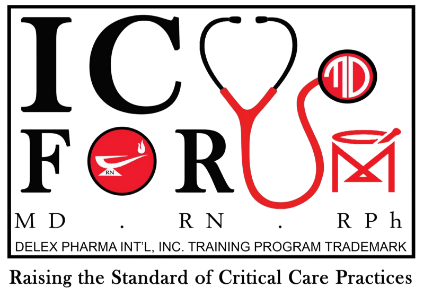
CHATROOM
PSYCHOSOCIAL IMPACT OF COVID-19 PANDEMIC TO FORNTLINERS
SPEAKER: Dr. Rhodora Andrea M. Concepcion
-Residency in General Psychiatry, Department of Psychiatry and Behavioral Medicine, University of the Philippines
-Post-residency Fellowship in Child and Adolescent Psychiatry, Department of Psychiatry and Behavioral Medicine, University of the Philippines-Philippine (2020-2022)
-Past President, Philippine Psychiatric Association (2018-2019)
The novel coronavirus outbreak threatens to worsen work-related stress among frontliners. Not only does the pandemic cause mass hysteria, economic burden, and financial losses, but it also aggravates the psychological impact on individuals who are in the front line. The possibility of mental and physical exhaustion among them is high due to their extended work hours, and their fear of getting infected. With their enduring sacrifices, they deserve the title of “modern heroes.”
As part of our public health response, the ICU Forum team worked with experts in developing guidelines to help support and manage the mental health of our frontliners. This webinar also serves as a guide for our healthcare professionals in the proper assessment of anxiety and worry experienced by the concerned workforce. During the online symposium, Dr. Concepcion tackled significant aspects related to psychological impact among frontliners. Let us have a quick run-down regarding this topic:
PHYSICAL ASPECT
We don't have full control of our lives at this time. Our frontliners are still in the process of undertaking effective and efficient ways against the crisis. It is saddening that some of them tested positive for the virus. There are many uncertainties causing worries within us. However, Dr. Concepcion reiterated that it is important to know how we can direct ourselves to overcome stress in these trying moments. Today, having a full understanding of the disease is crucial. Knowing the symptoms related to the virus would help you develop the essential actions you need to take for prevention.
PSYCHOSOCIAL AND EMOTIONAL ASPECTS
The most basic form of human social interaction has severely changed. It is something new to people. Physical or social distancing is among the current practices observed in this new norm. We cannot just touch people and be near to each other in public to avoid the spread of the virus. Moreover, the emotional aspect is also a concern in the midst of the health crisis. Dr. Concepcion advised that it is significant to keep our anxiety at an optimal level. She added that we should give a proper amount of time for ourselves to let our minds rest from the current situation. Furthermore, communication with our family plays a vital role in promoting emotional and mental wellness during this struggle.
These psychosocial and emotional crises should have urgent prevention and intervention models provided by the authorities to avoid its rapid growth.
SPIRITUAL ASPECTS
There must be a meaning and a force behind this erratic change we are struggling with right now. It must have come from ONE SUPREME AUTHORITY and POWER wanting to go deep into ourselves to remind us of our actions and decisions. Each day presents new sets of challenges that may give us reasons to pause and reorganize our lives. We have learned the science of how we can avoid getting infected with the virus. This time, let us protect ourselves by persistently praying and trusting in a Divine Being. Never lose hope and know that the Almighty is full of compassion.
We need to be resilient and embrace positivity as we go through these challenging times. Watch the video above for more information!



